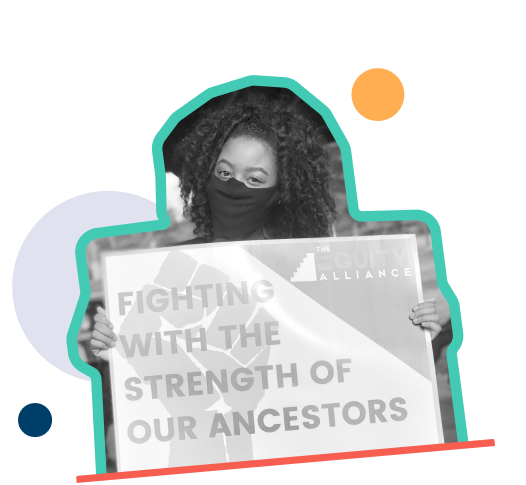NFG’s Convening this July in Nashville, TN, “Seeding (and Ceding) Transformational Power” brought movement leaders together with grantmakers to co-conspire and strategize around seeding transformational power — investing in grassroots powerbuilding, movement organizing and infrastructure, relationships, and supporting BIPOC communities now and for the long term — and ceding power — shifting and ending harmful philanthropic practices, being accountable to movement and communities, and partnering with movements to shift philanthropic portfolios in support of their long-term strategies.
IRSG wove across the convening, officially holding a half-day session in advance, as well as the highly attended “Winning in the States” breakout elevating the role of power-building organizers in rural areas to fighting authoritarianism and placed the spotlight on Tennessee organizers leading efforts to shift power and get campaign wins statewide. Across the event, the critical role of rural work was clear.
We heard from groups across rural areas putting complex strategies into action, serving their communities, and winning. We witnessed how rural organizers serve as first-movers in building winning campaigns. And, how investing in the leadership of rural power-builders reach past stale assumptions about who “is rural” and honor the unique intersections and powerful strategies that are essential to democracy funding.
We’re sharing reflections from Nashville as a rekindling of these conversations, and an invitation to carry them forward. As we head toward fall, we are eager to be in touch and gather across the IRSG network to continue our shared work.
Cross-pollination in the network—finding ways to learn from peers that allow each of us in our locations and positions to fortify our efforts, continue conversation, and resource mobilization are both long term and immediate needs. Whether you were with us in Nashville or not, let’s dig in and collaborate. We invite you to reach out to Biz Ghormley, Roots Revealed co-author and IRSG consultant to connect directly.
Conference Review
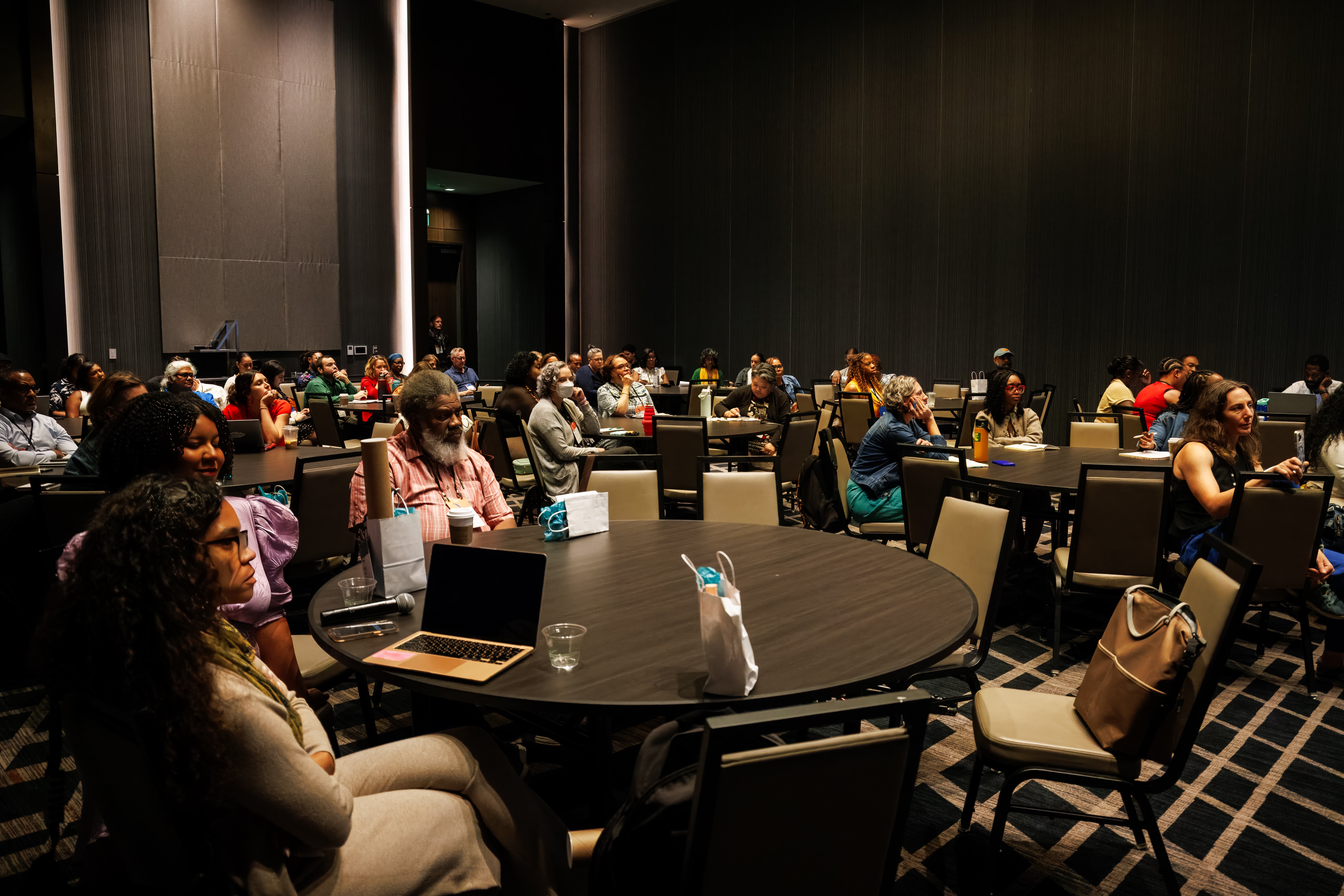
IRSG Network Strategy Session:
We were grateful to gather and reflect for an afternoon with funders and organizers interested in, or committed to, rural communities. We learned together, and mapped our distinct understanding, roles, and levels of immersion in the work to navigate our paths forward.
What does it mean to redefine winning from a narrow lens on the electoral polls and races, and reconsider the measures of success with frontline rural communities at the center? How can we follow their leadership and proven capacity to hold community, complexity, and a vision that is truly democratic, and in service of folks’ dignity and even joy?
We dug into the Roots Revealed: Spotlighting Rural Grassroots Models of Work that are Critical to a Multiracial Democratic Future report and rooted into political education on rural power-building.
Building upon the insights of the report, we considered the work in the current climate. Many of the organizations profiled in Roots Revealed now face intersecting attacks from the current administration. Cuts to the CDC, EPA, Medicaid, SNAP, increased ICE and DHS attacks, militarization and criminalization of communities and the border, expansion of carceral encroachment in rural areas, specific and targeted attacks on research, lawyers, leaders—and more—is already hitting those featured. Budgets are being slashed, dollars dragged back, and the philanthropic response has predominantly fallen far short of the immediately created needs.
Now is the time to invest. Communities are adapting to the moment. As Executive Director of Western Native Voice, Ronni Jo Horse, shared, “If there’s an ask to funders, it’s this: invest in long-term civic engagement, not just one-off campaigns. … When we’re resourced well we don’t just increase participation, we build movements that last generations.”
As funders navigate distinct conditions to move from vision into action, we look to the case studies, stories, and efforts different attendees are leading or learning from. The Roots Revealed report offerings of key attributes of funding rural grassroots power-building work continue to serve our coordination and strategizing together, and we’ve started mapping our work onto the “attributes of funding” featured in Roots Revealed.
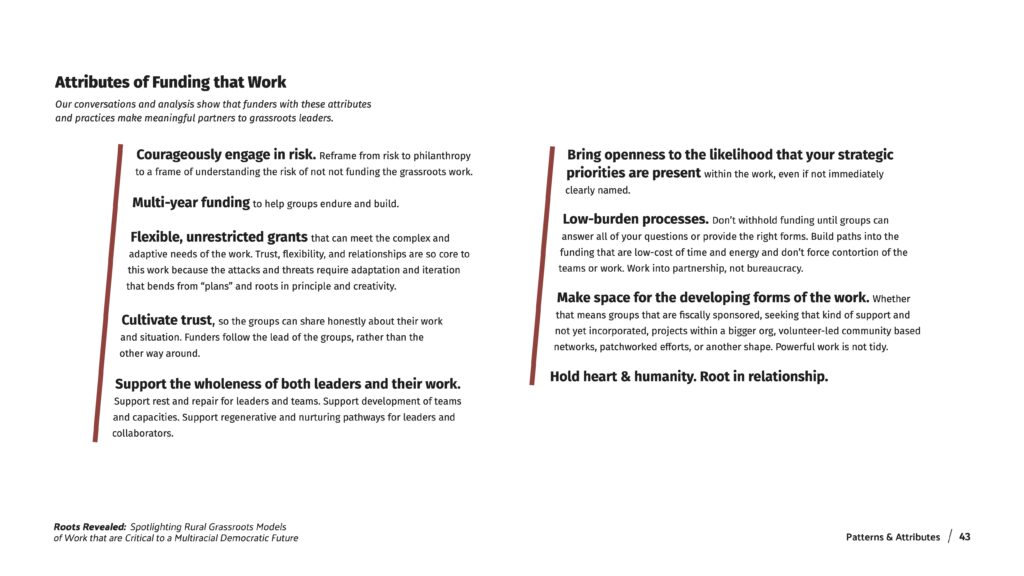
Attributes of Funding the Work pg. 43 in Roots Revealed: Spotlighting rural Grassroots Models of Work that are Critical to a Multiracial Democratic Future
At the gathering, round table conversations gave space for funders to head directly into critical conversation and build capacity to overcome challenges through topics including:
- Building the case / Defining rural;
- Redefining what it means to win - indicators of success in this moment;
- Funding rural organizing as a strategy;
- Putting relationships at the center - managing the possibilities and challenges;
- Is everything is democracy funding?;
- Rural power - getting real and strategic about the historical, local, and contextual complexity.
We began drawing forward where we need to learn, can offer peer-exchange, where we’re grappling with the same questions, and/or what existing models folks can adapt to move resources where they are equipped.
We want to connect the dots even further, and hear from you. How would you answer and offer into the conversion? We’d love to hear from your perspective.
Attendees left with a range of commitments to move and offer resources, including aims to:
- Lean more into courageous risk taking
- Evolve their strategies to explicitly include rural grassroots power-building organizing
- Expand resource mobilization by inviting other funders into actively aligned strategies
- Build relationships with folks doing the work in their region
- Stop over-intellectualizing community organizing
- Continue connecting with peers and grow the group of folks showing up
- Share stories and lessons from their efforts to start this work in their portfolios
Thanks to Coordinating Committee members and planning committee: Sherra Bennett, Winthrop Rockefeller Foundation; Corinne Conner, The Heinz Endowments; Sade Dumas, Borealis Philanthropies; Biz Ghormley, Philanthropic Consultant; Olivia Trabysh, Philanthropic Consultant; Joaquin Uy, Magic Cabinet.
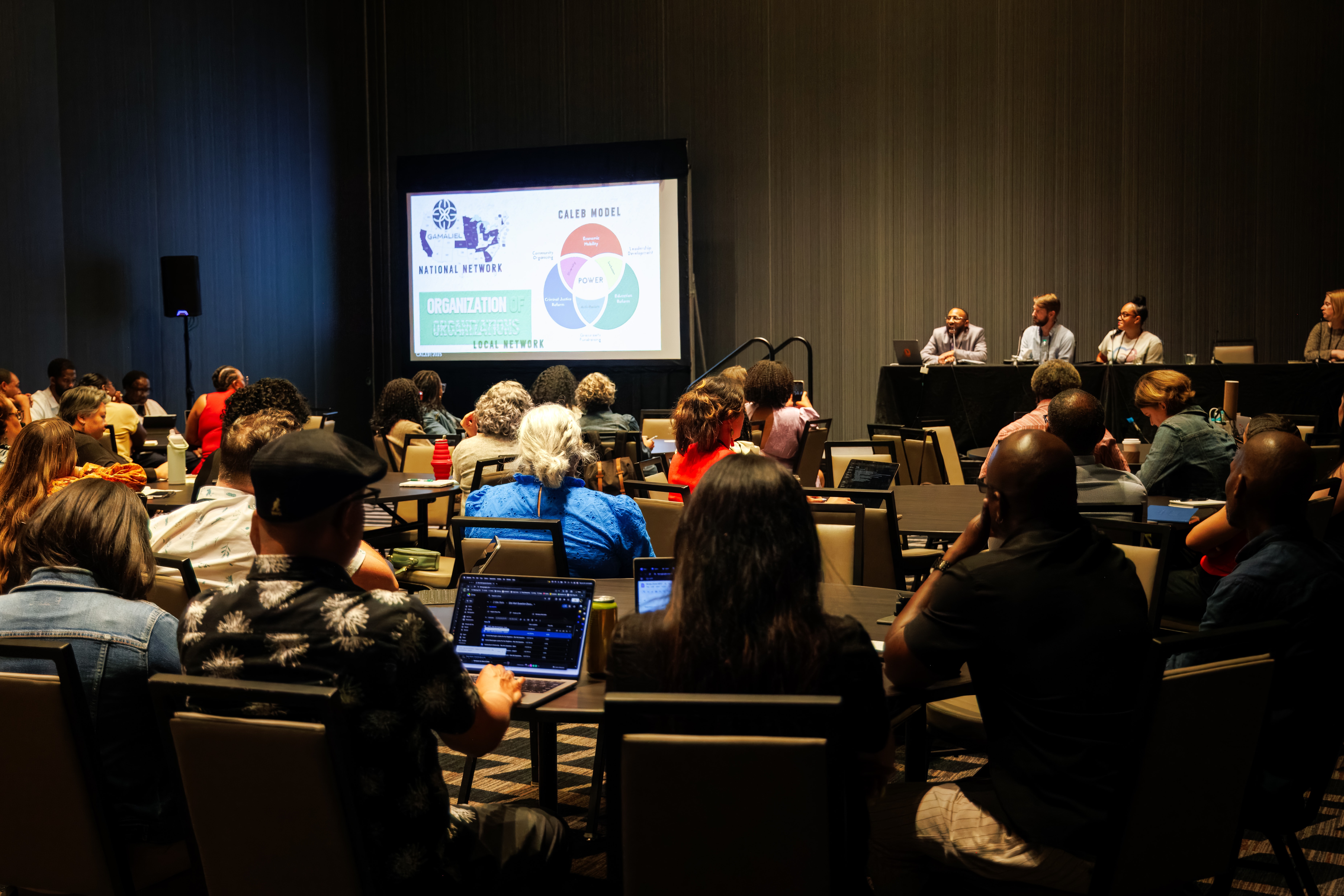
Live Conversation: Winning in the States: Coordinating Philanthropy to Resource at the Hyperlocal Level to Protect and Advance Statewide
Framed by IRSG Director Lindsay Ryder and Coordinating Committee member Sade Dumas of Borealis Philanthropy, the panel underscored a critical truth: philanthropy cannot afford to overlook rural communities if we are serious about statewide change.
The session drew one of the highest turnouts of the conference, filling the room with funders and organizers dialed in on the urgent and critical opportunities to demonstrate how investing in rural communities —often the backbone of state-level policy, narrative, and politics—can catalyze transformative change across the state.
The conversation brought together some of Tennessee’s rural and statewide grassroots organizing leaders, Dawn Harrington, Executive Director, FREE HEARTS; Austin Sauerbrei, Executive Director, Statewide Organizing for Community eMpowerment (SOCM); Allen Shropshire, Organizer / Transformational Justice Coordinator, CALEB sharing strategies like voter engagement, organizing in local governance, and protecting protest rights to protect and secure wins at the local, county, and even statewide levels around criminal justice reform, health equity, democracy, immigrant rights, worker justice.
A funder perspective was shared by from Kellie Terry, Philanthropy Program Director, North Star Fund on how she and the foundation are moving in New York to follow the lead of organizers like these folks, and turning to hyperlocal and particularly rural communities in states as a critical strategy to protect human safety, organize for change, and protect against authoritarianism.
Far too often philanthropy flocks to cities, because that's where the wins come faster. That's where the resistance is lower. But what happens when the rest of the state gets left behind? Those wins don't last. This is the risk we run when we don’t think statewide. We must invest in strategies that build power that is truly local and statewide, not just chase “easy wins” in metro areas.
We know the stakes couldn’t be higher. From legislation targeting bail funds to attacks on school boards and voter suppression - from anti-trans policy and litigation to efforts to criminalize and mass deport immigrants - rural areas are both ground zero for harmful policies and fertile ground for transformative organizing to shift state-wide power.
Attendees gathered around specific topics to reflect on the role of funders in advancing different strategies, and how we can better coordinate resources and align efforts to maximize impact on:
- Voter Engagement and Statewide Policy Reform: Explore how funders can invest in civic engagement to influence elections and legislative outcomes.
- Power Building in Local Governance: Discuss how organizing around school boards and other local institutions builds a foundation for statewide shifts.
- Defending Democracy and Protest Rights: Identify ways funders can support infrastructure like bail funds and legal defense to safeguard democratic freedoms.
Roots Revealed co-author, Biz Ghormley tied threads from the reports’ findings into conversation, elevating the practices, attributes, and approaches funders can take on to realize this work.
Across the convening →
From the main plenary stage to the learning visits in community, and in so many of the breakout sessions deep diving strategies and success stories, the power and possibility of resourcing rural grassroots power-building organizing could not be overstated. Rural voices shared clearly how their community-driven work is essential to our future, critical to our democracy. Funders ranged from deeply partnered to just starting to turn toward visioning and making efforts to resource and build with folks on the ground.
On the last day of the conference, a markerboard was placed in the snack area to gather insights from folks on what they were committing to, learning and leaving with, and to share “a-ha” moments folks had in their time on site, spotlighting the urgency of rural integrated strategies and funders’ action to engage with rural leaders and communities—now.
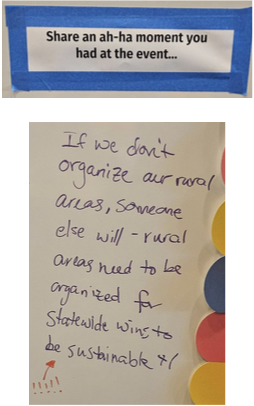
How do you think we can can we strategize to face this truth together this fall?
Looking ahead →
We know the convening is just a stepping stone along the path we are maneuvering across together. It was clear there are many of us attuned to the need for power-building strategies, resource mobilization, and relationship building with rural organizers and communities.
And it was clear that we are all in different places in our ability to act and realize our commitments, needing each other in nuanced ways to support our collective efforts. We hope to hear from you about the ways we could weave together in this work and navigating what it takes to make it happen.
We look forward to connecting more soon.


Posted 09/08/2025 in
Share
